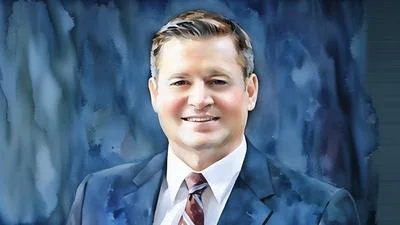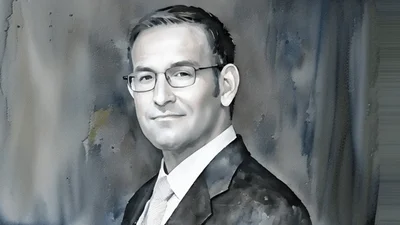Mark Clifford is president of the Committee for Freedom in Hong Kong Foundation. He was a director of Next Digital, the publisher of the pro-democracy Apple Daily newspaper, and editor in chief of the South China Morning Post. He is the author of, “Today, Hong Kong, Tomorrow The World: What China's Crackdown Reveals About Its Plans to End Freedom Everywhere.”
This transcript has been edited for length and clarity.
Federal Newswire: How does journalism in Asia today compare to journalism before the handover of Hong Kong?
Clifford: I went to Korea in June ‘87. Martial law in Taiwan was lifted in July that year. Korea started down its path to democracy when the government agreed, in the face of huge popular protests, to allow for democratic elections.
We were lucky enough to witness places that were building on their economic success and social development, which then went in a direction of much greater democratic political openness. I think that probably skewed my thinking and made me more optimistic about what would happen in China. But, there was barely any email. Phone calls were $3 a minute to the U.S. Communications were not by Internet.
We did have magazines like the Far Eastern Economic Review, which had the temerity to cover everything from Pakistan to Japan. And we had people like me, foreigners, who presumed to be writing about a country, because local journalists for the most part couldn't do that or they'd be thrown in jail. I had a very brave Korean colleague, Shim Ji Hoon, who actually had to leave the country for much of the 1980s because of his involvement with good coverage of the Quang Ju killing. The Tiananmen of Korea in the early 1980s was really tough for journalists.
There wasn't information, there was censorship…The few Koreans who got the Far Eastern Economic Review or the Asian Wall Street Journal got it a day or two late might have pages missing or articles cut out. It's almost unimaginable to think of how sheltered and cosseted we were, and then what a commodity information was.
But that actually takes us to the events of June 4th, 1989, when we listened to shortwave radio and heard the stories of the massacre unfolding in Beijing and in Hong Kong at that time— hundreds of thousands of people had been marching in the streets in support of the protesters in Tiananmen. Among them was a young garment industry executive named Jimmy Lai.
He looked at the events of Tiananmen, and he realized that an upstart network named CNN was there, and that, along with other broadcast networks, they were able to cover events almost in real time. In the past, if something bad had happened, and as it did in Taiwan or Korea, where there were killings, nobody would know about it or a little information would trickle out.
There certainly weren't real time images. Interestingly, that revolution in media is what prompted Jimmy Lai to say, I'm getting out of garments, I'm getting out of the retail business, and I'm going into media, because media is information. Information is going to be a commodity. There's going to be more of it. But it's also transparency [that’s] going to sweep away corruption.
It's going to sweep away totalitarianism. I'm going to start a magazine and I'm going to help Hong Kong, and I'm also going to help China in their process of economic reform and ultimately of political reform.
Federal Newswire: Did you witness events in China that led you to believe they would move in such a way against Hong Kong?
Clifford: Everything looked like it was going in the right direction. China wanted to host the Beijing Olympics. It wanted to get into the WTO. It wanted to be taken seriously as a negotiating partner with the U.S. [and] with the EU.
They were on really good behavior. They made all these promises and Mao was fading into the past. He died in the mid 1970s. Two decades since then, we were almost 20 years into the economic reform process.
[Jimmy Lai] was almost like a Zionist, he was so pro-China. He just believed in China. He loved it. He really thought Deng Xiaoping and economic reform [were] going to change China, or make it rich and make it modern. Yet, I talked to a friend who was with him the night [of the Hong Kong handoff], and he was gloomy.
The rest of the city was partying, fireworks were going off, and he had a small gathering at his house, and everybody was trying to be happy. He was sitting there morose, and I remember seeing him crying on stage in front of 500 people a few weeks earlier, saying he thought he was going to go to jail. This was 1997.
From time to time, there'd be rumors that there's some secret list of people they're going to round up. Well, that list may or may not have existed, but most of those people who were on that putative list had been rounded up. Look, when things like this happen, most of us as humans are more or less hardwired for optimism, for figuring we'll work things out somehow.
We had more than just hope. We had promises–a solemn UN-registered treaty that the Chinese had signed with Britain. We had the Basic Law, where China promised the people of Hong Kong all the rights and freedoms that they had under the British colonial period, and more. We'd have a path to universal suffrage so we could elect our mayor and our city council, which is really all that it was about, and free speech, all these promises.
Federal Newswire: What were your perceptions of U.S. policy at this time and what impact did it have on the Hong Kong situation?
Clifford: I think benign neglect pretty much sums it up. The Hong Kong people were promised democracy. They were told [that in] 2007–ten years after the handover--there would be fully-free elections, at least for the city council.
2007 came and went, and the can kept getting kicked down the road by one Chinese official after another, depending on who was in power.
One of the worst legacies the British left was an inability to train a political class. They didn't develop political leaders, and so they didn't have people who could stand up to Beijing the way a provincial governor or even a mayor of a large city could in China. Hong Kong's leaders didn't know how to fight for the people of Hong Kong, so they got squeezed. I'm not trying to shed any tears for them because they didn't stand up.
But the students and a younger generation, much to China's surprise, you had people who were born around the time of the handover who didn't remember British colonialism and how bad and oppressive it was. They just knew that China had promised them democracy. These were international citizens, people who travel around the world who eat at the best restaurants, go to the best museum to see what politics looks like in New York, London, or even Bangkok. They didn't like these excuses anymore.
You had the inability and the weakness, the fecklessness really, of the Hong Kong leadership, coupled with the increasing demands of a younger generation, really kind of pushing things.
Federal Newswire: What changed in China’s approach?
Clifford: I think we forget that Xi Jinping actually took a very close interest in Hong Kong, starting at least three or four years before he took power. I think, fundamentally, though, because the Chinese Communists lied to each other, they lied to themselves about the people of Hong Kong.
They've always gotten bad intelligence. This goes back at least to the early 1980s, with their claptrap about British colonial oppression. I'm not trying to sugarcoat anything about British colonial rule. There were a lot of things that were not nice about it, but the people of Hong Kong were not about to rise up against their colonial masters in hopes of inviting their red friends from the North.
Everybody in Hong Kong had left to escape the Communist Chinese or their parents or their grandparents had left. So, number one, the Chinese convinced themselves that Hong Kong was going to welcome them with open arms. The reason they promised free elections after 10 years is that they thought they could control, cajole, bribe, beat, bully, whatever it took to win elections.
When it became clear that in every single election since 1990 that six out of 10 people always voted for the pro-democracy candidate, that's really hard for the Chinese Communists to accept, because they all lie to themselves. I honestly think that they completely misunderstood Hong Kong.
They talked to the business elite, they didn't talk to the people of Hong Kong, even though they had good grassroots organization. Xi Jinping came in and got involved about 10 years after the handover, at a time when it became clear that Hong Kong was not just going to go gently under Beijing's control.
In 2014, during the Umbrella Uprising, the Communist Chinese never wanted to engage with the people of Hong Kong. What they wanted was just to get deals done and treaties signed. They were very transactional.
The more they screwed down, the more the people resisted. From about 2012, when you had students protesting against a proposal to have Communist-style indoctrination in schools…and then the summer of democracy in 2019, you had increasing millions of Hong Kongers out on the streets saying, ‘we don't want this.’ But the Chinese Communist Party knows only one way to react to opposition, and that's to crush it
Federal Newswire: How should we view our relationship with China, particularly as it relates to Taiwan?
Clifford: Perhaps I could channel Ronald Reagan and say trust but verify. I'm not even sure I'd trust, but I definitely would verify. I think we see that China will not keep to its international agreements except when it suits them…It says that it wants a rules-based order, international order. Yet, when it lost a case regarding the South China Sea with the Philippines, it just ignored it.
For years China said everyone on both sides of the Taiwan Strait want reunification. That's obviously not true. What do they do? They just say, well, in that case, we're just going to take you.
There is no way that China has the right to Taiwan, and the people of Taiwan have made it really clear they don't want that. I think that there's no way that they should be trusting any promises that China makes. I think we've seen the deterrence has worked, and I hope it will continue to work, but it's only going to work if it's backed up with sticks
Federal Newswire: What is the Committee for Freedom in Hong Kong Foundation?
Clifford: We set up in the wake of the 2019 protests and above all, the 2020 national security law that saw hundreds of people put into jail on national security charges and, more broadly, a general crackdown on civil society, on media, on freedom.
It's easy to forget this little place [with] 7.5 million people, particularly when atrocities like the genocidal behavior that the Chinese are displaying towards Uyghurs and the forced labor out in the Xinjiang region—the hundreds if not thousands of political prisoners being held in Chinese jails. It's easy to forget, because Hong Kong, on the surface, has its Michelin starred restaurants and its nice hotels.
We want to remind people when you go to those banking conferences and you're at the Four Seasons or the Conrad or the Shangri-La hotel that is literally just a couple hundred yards away, people are undergoing political trials, and these are the same people that you might have had dinner with a few years earlier. There are people from 11 to 87 who have been arrested there, over 10,000 people who were arrested on political charges since the 2019 events.
Most of them, in fact, have not actually been formally charged or tried. Three quarters of them, over 7,000, are sitting out there with their travel documents withheld. They've got charges hanging over their heads. 2,000 plus have been convicted, most of whom are serving time.
You have hundreds of people who have been pulled in under the national security law charges. We count over 1,800 political prisoners in Hong Kong at this moment and it still keeps going up.
We have offices in London and in Washington, D.C., and we think the road to change in Hong Kong is running through elected legislators in these two prominent places.
Our website is thecfhk.org. My Twitter is @MarkIClifford. I've got a book coming out on Jimmy Lai later on this year.
We look for support anywhere we can find it, because the fact that a city that was as free and open as Hong Kong could be crushed so quickly and so thoroughly should give us all a pause.








